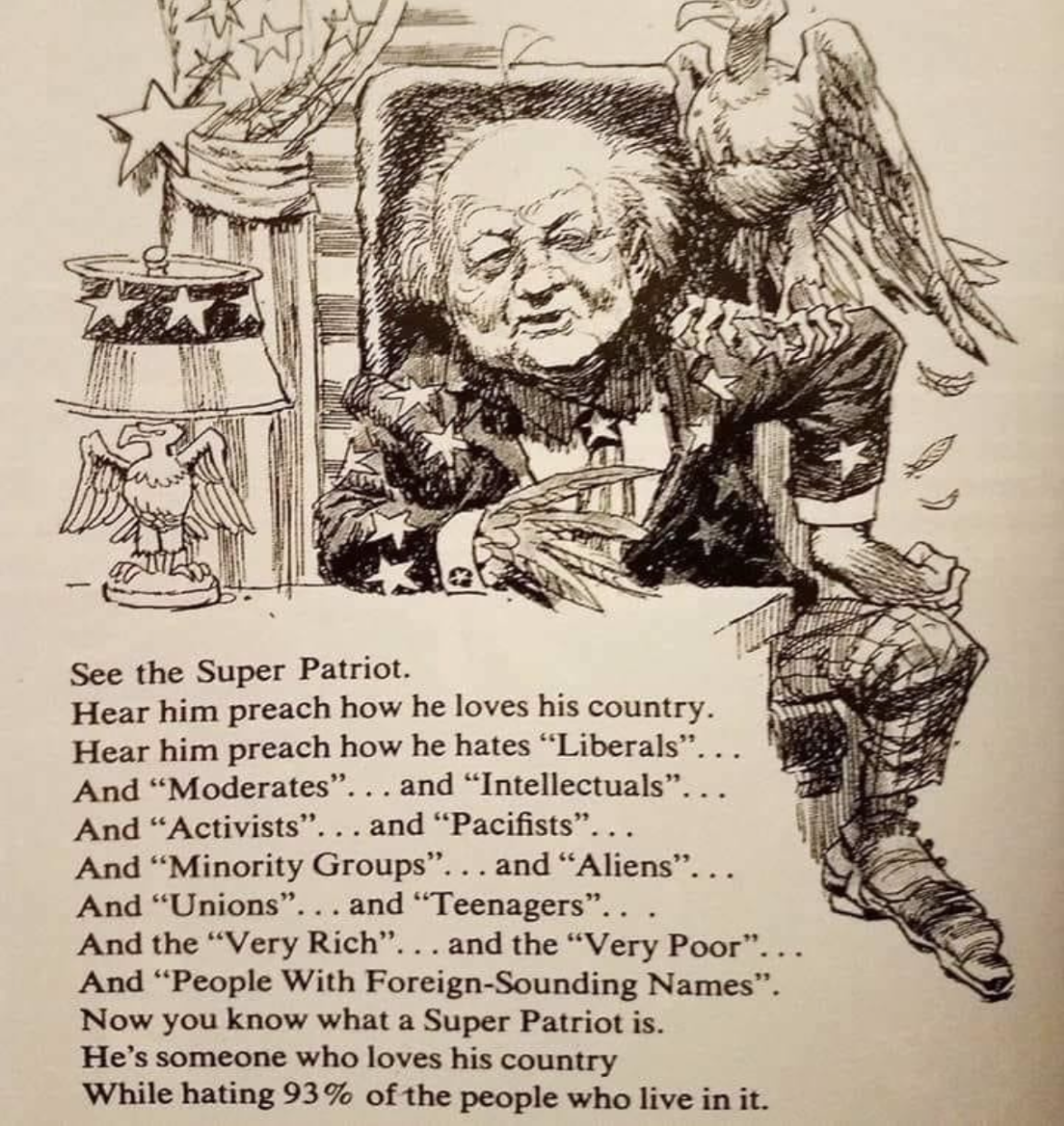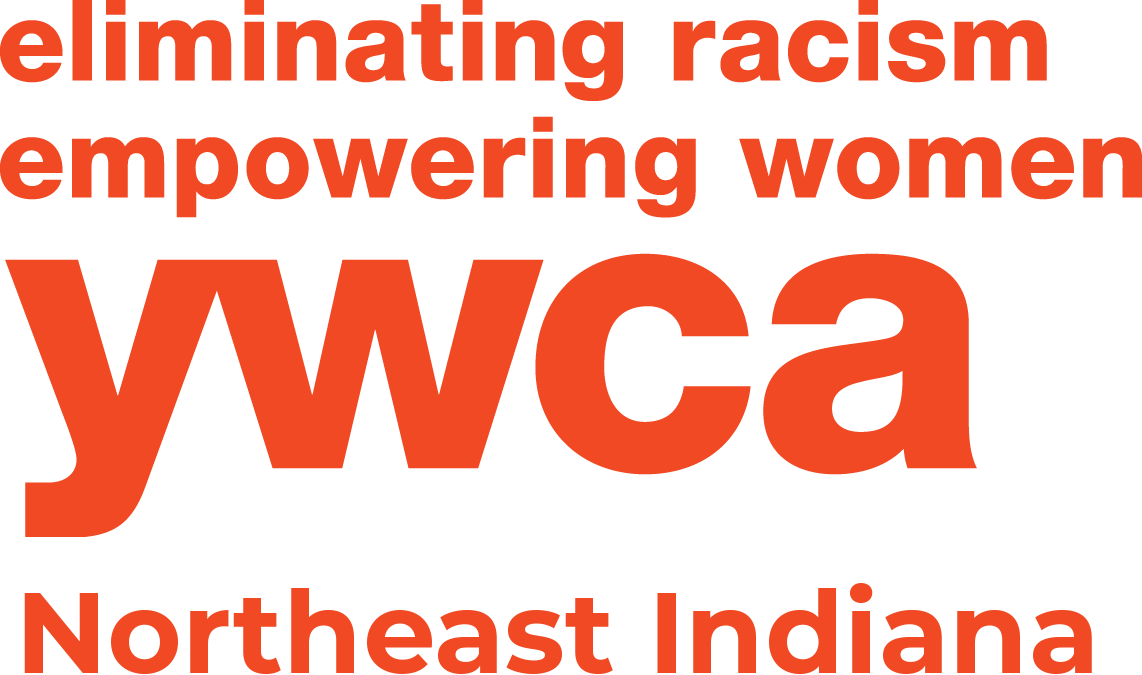Dear AllY,
As someone who grew up in the faith tradition of Jehovah’s Witnesses, I have never had a sentimental attachment to most holidays. However, the start of a new year is my favorite celebratory time. Admittedly, my birthday is in January but that’s not why I love to celebrate the New Year. I love the opportunities for growth a new year can bring. How lucky are we, like the mythological Greek god Janus, to be able to look both forward and backwards at the same time! And for as long as we are able to, we as individuals and within our own communities, should be able to take the time to reflect backwards as we prepare to move forward.

“Super Patriot” cartoon featured in MAD Magazine in 1969
Perhaps, by now you’ve noticed the graphic included in this month’s blog, a cartoon featured in Mad magazine in 1969.The resounding message of this image is that of exclusivity. And, yet it is not the message of division that saddens me the most. At the close of 2023, 54 years since the publishing of the Super Patriot cartoon, our country is still experiencing significant rates of hate crimes. Do Americans still hate 93% of our own people? It saddens me that we still find ourselves among people who seemingly continue to value social and cultural exclusion. Are we, as a society, valuing exclusion, or are we grossly falling short in knowing what we can do to move forward; to become unstuck, so to speak.
How many more generations are we going to inculcate humans with concepts of cultural and racial hierarchy? Has the concept of racial order always been untenable in our society? And, could it be that’s why racism and bigotry has to constantly change its approach to exclusion and oppression? The insistence of prioritizing a sense of racial order in our society comes at the forsaking of true justice, democracy and equity for all. Instead of teaching racial order, I propose that by teaching cultural inclusion to younger generations, the return of investment would look like a more just and equitable society.
Some people may say that significant progress has been made in reducing racial exclusion over the years. It is easy to look back on American history and see the very obvious ways that racial progress has been made, but is it fair to classify this progress as being ‘significant’? Many may tell racial minorities to take comfort that these are not slavery times, nor the Jim Crow south, and we are less likely than our parents and grandparents to be called a colorful euphemism to our face. But, as a society, we need to understand that this ‘progress’ is a rather superficial treatment of the contemporary minority experience. Today’s racism and bigotry look like normal patterns of practices in business, healthcare, education and the criminal justice system. In any of these given social sectors, industries, or microcosms of society, there are individuals who still contribute, whether consciously or not, to the marginalization of communities of color.
So, what can we do as a community to work to eliminate racism? Why is diversity and Allyship important? We begin by putting a spotlight on how we as individuals navigate racial dynamics. It is important for people of color to not only be AT a conversation, but to be present IN the conversation. People of color may be able to bring a greater sense of understanding as to why conversations are not evolving. And, when we feel our voice is not truly valued, we can be reluctant to participate in superficial and performative approaches. From our white counterparts, we are overwhelmingly met with a deafening silence when uncomfortable conversations take place, which I have come to understand to be a reluctance to offend or avoidance of discomfort. It is in this way that progress gets stifled. So, why is diversity and Allyship important? It is necessary to evoke change in systemic racism by truly valuing and practicing qualities of diversity, equity, and allyship.
Additionally, our region is changing in the makeup of our constituents. People are moving into the city from the counties. We are welcoming immigrants at astonishing rates, which also have major implications on the makeup of our community. This means people from ALL cultural backgrounds are facing new social terrains. That is why, with the year 2024 quickly approaching, YWCA Northeast Indiana’s racial justice programming will continue focusing on the topic of ALLYSHIP.
We have revamped our Diversity 101 community education program, and hope to build allyship by offering this training. Please contact me if you are interested in becoming an Ally in this way. Also, our Diversity Dialogues series will continue. It is also my hope to develop a film series accompanied by facilitated community conversations around the topic of cultural diversity. Our Racial Justice Blog will also continue, focusing on historical models of allyship. We will also be offering a 4 session program to those organizations who are invested in doing individual and collective work around Cultivating Allyship and Racial Equity (C.A.R.E.). As we continue the work of YWCA Northeast Indiana, which started nearly 130 years ago, our 2024 programming will be centered around nurturing the sense of inclusion and belonging in our communities.
Happy New Year! I look forward to our work as Allies.
Heather Guy, Racial Justice Coordinator
Contact Heather: hessex@ywcaerew.org
Allyship Toolbox
